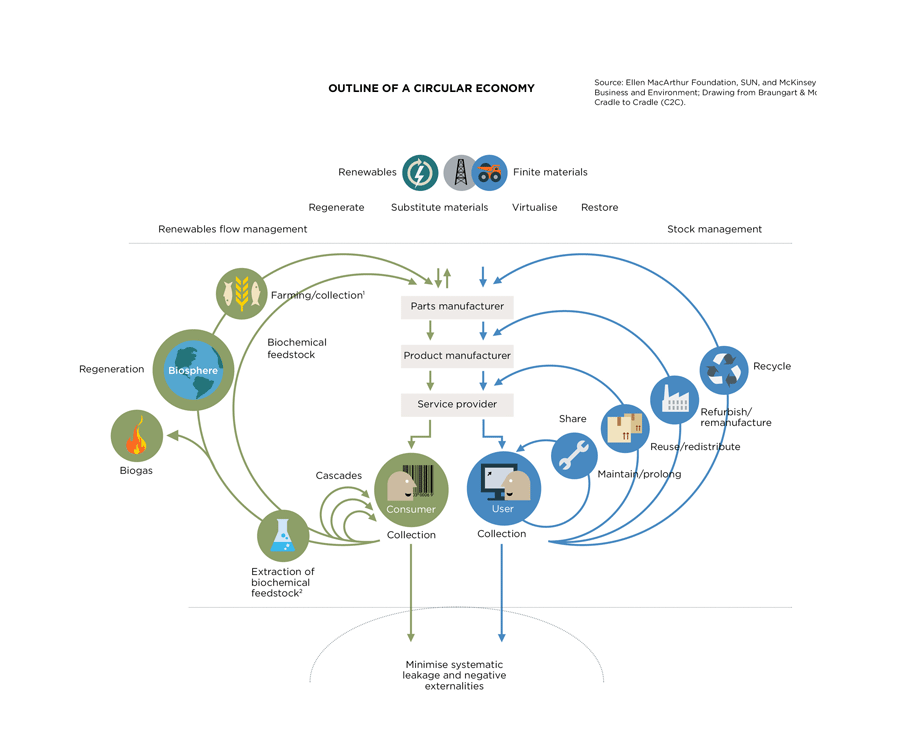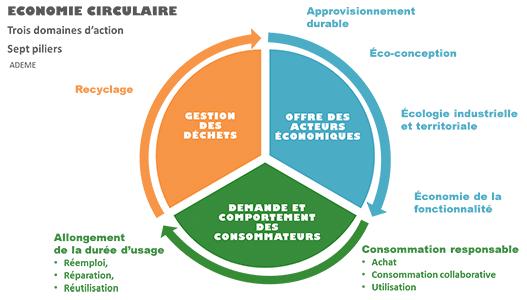Definition of the circular economy
DEFINITIONS OF THE CIRCULAR ECONOMY
The circular economy is neither the economy of waste nor that of recycling. It brings together a set of practices, prioritized according to their impact, intended to optimize the use of materials and energy.
An attempt to define the circular economy has been provided by the United Nations:
 "The circular economy is a system of production, exchange and sharing enabling social progress, the preservation of natural capital and economic development as defined by the Brundtland Commission.
"The circular economy is a system of production, exchange and sharing enabling social progress, the preservation of natural capital and economic development as defined by the Brundtland Commission.
Its ultimate aim is to disconnect economic growth from the depletion of natural resources by creating innovative products, services, business models and public policies, taking into consideration all flows throughout the life of the product or service.
This model is based on optimum use of resources and on creating positive value loops. It focuses on new design, production and consumption methods, extending the service life of products, and the refurbishing and recycling of components".
This definition is reflected in the illustration showing the "circular economy model"
- products must be designed to be simple, both during their construction and when in use,
- products must be designed so as to be repairable and their maintenance scheduled,
- products should be refurbished and shared to maximize their use,
- it must be possible for products to be dismantled with a view to reusing functional subsystems that supply the construction of new products,
- parts that can no longer be remanufactured are recycled where possible.

Illustration 1: The value loops of the circular economy (source: the Ellen MacArthur Foundation)
In France, the most widely recognized definition is that given by ADEME:
"The circular economy is an economic system for exchange and production which, at all stages of the product life cycle (goods and services), aims to increase the efficiency of resource use and reduce the impact on the environment, while enabling people to live well". (source: ADEME, 2014. Economie circulaire (Circular economy): Notions)
Both definitions see circular economy as an operational deployment with the founding principles of sustainable development. The creation of new value loops promoted by the circular economy does indeed aim to address all the social, economic and environmental issues associated with our current patterns of production and consumption.
THE CIRCULAR ECONOMY: A PRACTICE-ORIENTED CONCEPT
The circular economy is based on established scientific fields (eco-design, industrial ecology, life cycle analysis, analysis of material flows, etc.). It promotes the search for practical, technical and/or organizational solutions, involving all those working in social and economic fields.
The organisation of the circular economy into seven pillars distributed along the value chain results from the desire to facilitate appropriation of the concept by those involved in each step of the life cycle of a product.

Illustration 2: The seven pillars of the circular economy (source: ADEME)
But the circular economy is not simply a question of adding up good individual practices. Integration of the value chain and multi-stakeholder cooperation are essential to the development of systemic responses to twenty-first century resource issues. These pillars cannot and must not be considered independently of each other.
For example, eco-design, industrial ecology and functional service economy contribute significantly to extending the life of products and recycling. Similarly, sustainable procurement and responsible consumption depend on using sustainable or recycled products.
The development of the circular economy involves political, civil and economic stakeholders adopting reciprocal commitments that take into account the medium term rather than just immediate market imperatives. (Consult the article Responsabilité et Environnement - L'économie circulaire : les enjeux économiques d'une transition écologique) Responsibility and Environment - The circular economy: the economic stakes of ecological transition